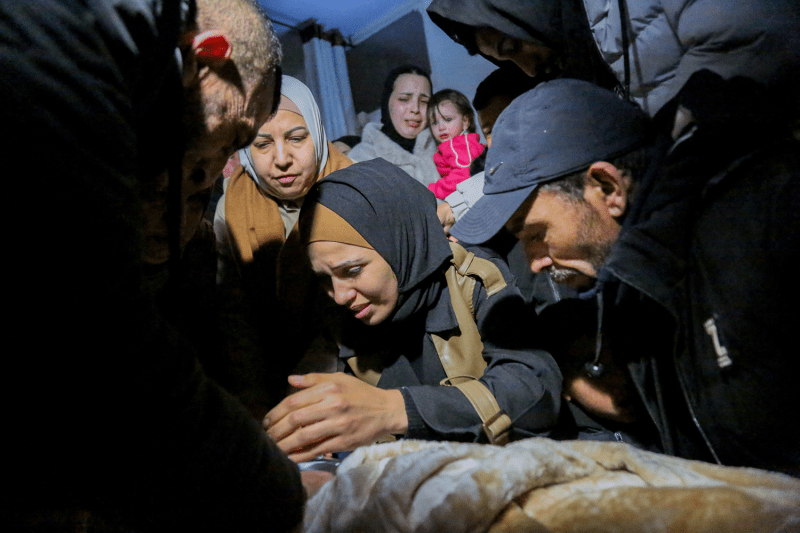Israel’s Actions Strike at the Foundations of International Law

Israel’s Actions Strike at the Foundations of International Law
Only collective state action can end impunity.
Family members mourn over the body of Ayman Nassar al-Haymouni, a 13-year-old killed in an Israeli raid, in Hebron, West Bank, on Feb. 22. Mosab Shawer/Middle East Images/AFP via Getty Images
What remains of the international order? For more than 500 days, Israel, enabled by powerful nations providing diplomatic cover, military hardware, and political support, has systematically violated international law in Gaza. This complicity has dealt a devastating blow to the integrity of the United Nations Charter and its foundational principles of human rights, sovereign equality, and the prohibition of genocide. A system that permits the killing of an estimated 61,000 people is not merely failing—it has failed.
The evidence, livestreamed to our phones and assessed by the world’s top courts, is unequivocal. From the International Court of Justice’s advisory opinion on Israel’s illegal occupation of Palestinian territories to the arrest warrants issued by the International Criminal Court (ICC) for Israel’s top leaders to the preliminary measures issued in the Genocide Convention case brought by South Africa, Israel’s actions constitute clear violations of international law.
What remains of the international order? For more than 500 days, Israel, enabled by powerful nations providing diplomatic cover, military hardware, and political support, has systematically violated international law in Gaza. This complicity has dealt a devastating blow to the integrity of the United Nations Charter and its foundational principles of human rights, sovereign equality, and the prohibition of genocide. A system that permits the killing of an estimated 61,000 people is not merely failing—it has failed.
The evidence, livestreamed to our phones and assessed by the world’s top courts, is unequivocal. From the International Court of Justice’s advisory opinion on Israel’s illegal occupation of Palestinian territories to the arrest warrants issued by the International Criminal Court (ICC) for Israel’s top leaders to the preliminary measures issued in the Genocide Convention case brought by South Africa, Israel’s actions constitute clear violations of international law.
Yet, despite these rulings, the violations persist, enabled by nations that brazenly challenge the world’s top courts—with sanctions on officials, employees, and agents of the ICC and open defiance of the court’s orders.
The recent proposal by U.S. President Donald Trump to “take over” Gaza—meaning annexation followed by ethnic cleansing of the Palestinian population, who Trump has suggested should be deported to Egypt and Jordan—strikes at the very foundations of international law, which the global community has a duty to defend. Such actions, if pursued, would constitute a grave violation of international law and the fundamental principles enshrined in the U.N. Charter.
The assault against the Palestinian people echoes dark chapters in our own countries’ histories—South Africa under apartheid, Colombia during counterinsurgency, and Malaysia under colonial rule. These struggles remind us that injustice anywhere is a threat to justice everywhere. We may hail from different continents, but we share the conviction that complacency is complicity in such crimes. The defense of the inalienable right of the Palestinian people to self-determination is a collective responsibility.
In September 2024, the U.N. General Assembly adopted a historic resolution outlining states’ legal obligations to ensure the end of Israel’s illegal occupation, with an overwhelming majority of 124 nations voting in favor, emphasizing the imperative of “ensuring accountability for all violations of international law in order to end impunity, ensure justice, deter future violations, protect civilians and promote peace.”
That is why, alongside Bolivia, Colombia, Honduras, and Namibia, we have launched the Hague Group, a coalition committed to taking decisive, coordinated action in pursuit of accountability for Israel’s crimes.
The Hague Group’s three inaugural commitments are driven by twin imperatives: the end of impunity and the defense of humanity.
Our governments will comply with the warrants issued by the ICC against Israeli Prime Minister Benjamin Netanyahu and former Defense Minister Yoav Gallant, emphasizing appropriate, fair, and independent investigations and prosecutions at the national or international level; we will prevent vessels carrying military supplies to Israel from using our ports; and we will prevent all arms transfers that risk enabling further violations of humanitarian law.
In an interconnected world, the mechanisms of injustice are found in the fabric of global supply chains. Advanced weaponry cannot be built without metals, components, technology, and logistics networks that span continents. By coordinating our policies, we aim to build a bulwark to defend international law.
The aim of these efforts is not to undermine multilateralism; it is to salvage it. Just as the international community once united to dismantle apartheid in South Africa—through similarly coordinated legal, economic, and diplomatic pressure—we must now unite to enforce international law and protect the inalienable right of the Palestinian people to self-determination. The alternative is surrender to a world where might alone determines which laws matter and which others can be violated at will.
The recent cessation of hostilities, exchange of hostages, and return of displaced Palestinian families are welcome steps toward a peaceful resolution of this unbearable catastrophe. However, the cease-fire has already proved fragile, and our collective responsibility to ensure a lasting peace is now burningly urgent.
The international system cannot endure if it is undermined by those who wield vetoes and sanctions to shield allies from scrutiny or use aid and trade as tools of coercion. The threat of punishment is intended to force countries to retreat to a language of pleas. We cannot remain passive and be forced to publish “calls” and “demands” while the principles of justice that underpin our international order are destroyed.
We believe in protagonism, not supplication. The choice is stark: Either we act together to enforce international law or we risk its collapse. We choose to act, not only for the people of Gaza but for the future of a world where justice prevails over impunity.
Let this moment mark the beginning of a renewed commitment to internationalism and the principles that bind us as a global community.
Cyril Ramaphosa is the president of South Africa.
Anwar Ibrahim is the prime minister of Malaysia.
Gustavo Petro is the president of Colombia.
Varsha Gandikota-Nellutla is the general coordinator of Progressive International and acting chair of the Hague Group.
More from Foreign Policy
-

People stand in front of NATO headquarters in Brussels. It’s Time for Europe to Do the Unthinkable
Brussels has slavishly followed Washington for too long—and forgotten how to advance its own geopolitical interests.
-

Samuel Huntington holds his hand to his chin while sitting in an office. Samuel Huntington Is Getting His Revenge
The idea of a global “clash of civilizations” wasn’t wrong—it was just premature.
-

German Chancellor Olaf Scholz visits weapons maker Rheinmetall in Unterluess, Germany on Feb. 12, 2024. How Europe Can Defend Itself
Here are 10 steps European leaders can take now to bolster the continent’s defenses without U.S. help.
-

J.D. Vance gestures with both hands open as he speaks into a microphone during the Munich Security Conference. Vance wears a black suit with a blue tie. The New Meaning of ‘Munich’
After J.D. Vance’s bizarre speech, a word synonymous with appeasement may now signal the voluntary surrender of global hegemony.







Join the Conversation
Commenting on this and other recent articles is just one benefit of a Foreign Policy subscription.
Already a subscriber?
.
Subscribe
Subscribe
View Comments
Join the Conversation
Join the conversation on this and other recent Foreign Policy articles when you subscribe now.
Subscribe
Subscribe
Not your account?
View Comments
Join the Conversation
Please follow our comment guidelines, stay on topic, and be civil, courteous, and respectful of others’ beliefs.
Change your username |
Log out
Change your username:
CANCEL
Confirm your username to get started.
The default username below has been generated using the first name and last initial on your FP subscriber account. Usernames may be updated at any time and must not contain inappropriate or offensive language.